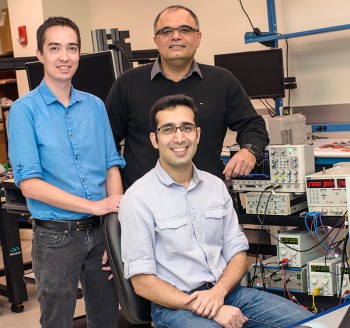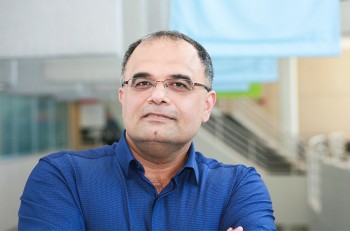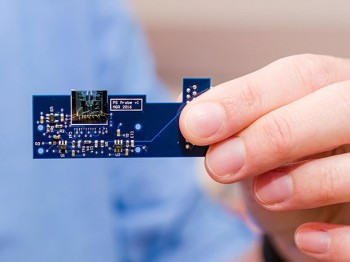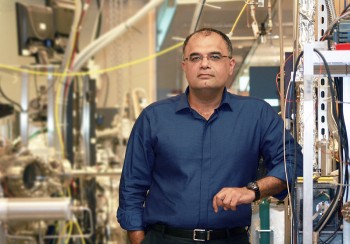PhD - Electrical Engineering
University of New South Wales - 1996

Reza Moheimani
James Von Ehr Distinguished Chair in Science and Technology
Professor - Systems Engineering
972-883-4158
ECN2902
ECN2902
Professional Preparation
MEngSc - Electrical Engineering
University of New South Wales - 1993
University of New South Wales - 1993
BSc - Electrical Engineering
Shiraz University - 1990
Shiraz University - 1990
News Articles
Jonsson School Professors Named Fellows of National Tech Groups
 Two Erik Jonsson School of Engineering and Computer Science professors at The University of Texas at Dallas have received top honors from professional technology organizations for outstanding achievements in their fields.
Two Erik Jonsson School of Engineering and Computer Science professors at The University of Texas at Dallas have received top honors from professional technology organizations for outstanding achievements in their fields.Jonsson School Engineers Shrink Microscope to Dime-sized Device
 Researchers at The University of Texas at Dallas have created an atomic force microscope on a chip, dramatically shrinking the size — and, hopefully, the price tag — of a high-tech device commonly used to characterize material properties.
Researchers at The University of Texas at Dallas have created an atomic force microscope on a chip, dramatically shrinking the size — and, hopefully, the price tag — of a high-tech device commonly used to characterize material properties. “A standard atomic force microscope is a large, bulky instrument, with multiple control loops, electronics and amplifiers,” said Dr. Reza Moheimani, professor of mechanical engineering at UT Dallas. “We have managed to miniaturize all of the electromechanical components down onto a single small chip.”
Nanotechnology Expert Fills Distinguished Chair in Engineering
 Dr. Reza Moheimani, an expert in nanotechnology, has joined the Erik Jonsson School of Engineering and Computer Science at UT Dallas this fall as the James Von Ehr Distinguished Chair in Science and Technology and Professor of Mechanical Engineering.
Dr. Reza Moheimani, an expert in nanotechnology, has joined the Erik Jonsson School of Engineering and Computer Science at UT Dallas this fall as the James Von Ehr Distinguished Chair in Science and Technology and Professor of Mechanical Engineering. Moheimani will provide leadership to identify opportunities and challenges for micro- and nano-manufacturing research at a time of remarkable progress in nanotechnology.
New Paradigm in Microscopy: Atomic Force Microscope on a Chip
 Ever since the 1980s, when Gerd Binnig of IBM first heard that “beautiful noise” made by the tip of the first scanning tunneling microscope (STM) dragging across the surface of an atom and later developed the atomic force microscope (AFM), these microscopy tools have been the bedrock of nanotechnology research and development.
Ever since the 1980s, when Gerd Binnig of IBM first heard that “beautiful noise” made by the tip of the first scanning tunneling microscope (STM) dragging across the surface of an atom and later developed the atomic force microscope (AFM), these microscopy tools have been the bedrock of nanotechnology research and development.AFMs have continued to evolve over the years, and at one time, IBM even looked into using them as the basis of a memory technology in the company’s Millipede project. Despite all this development, AFMs have remained bulky and expensive devices, costing as much as US $50,000.
$2.4 Million Grant Gives Big Boost to Atomic-Level Manufacturing Project
 Dr. Reza Moheimani, professor of systems engineering at The University of Texas at Dallas, recently received a $2.4 million grant from the U.S. Department of Energy to develop a platform technology for high-throughput, atomically precise manufacturing (APM).
Dr. Reza Moheimani, professor of systems engineering at The University of Texas at Dallas, recently received a $2.4 million grant from the U.S. Department of Energy to develop a platform technology for high-throughput, atomically precise manufacturing (APM).The grant builds on innovative work led by Moheimani in scanning tunneling microscopy. Moheimani, who holds the James Von Ehr Distinguished Chair in Science and Technology, aims to develop enabling technologies for a novel approach to atomically precise manufacturing, which is essentially a form of 3D printing with atomic precision.